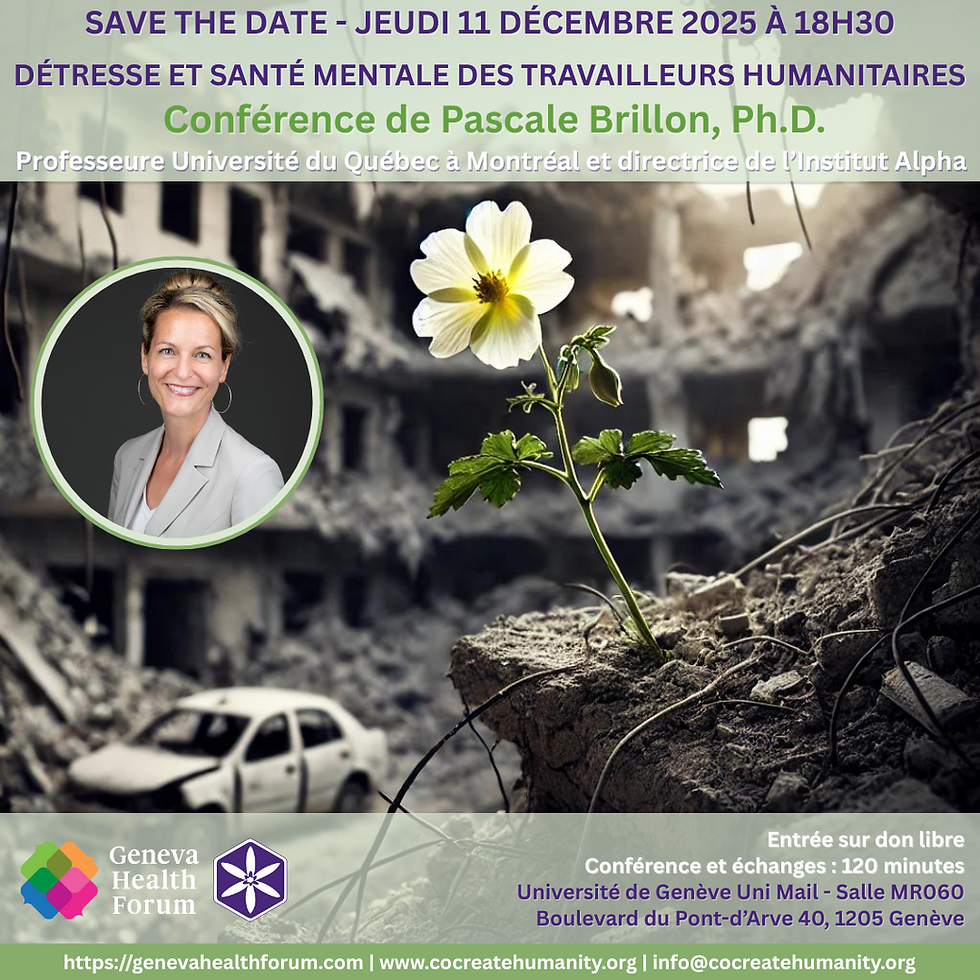Video available | Post-traumatic stress disorder and Reconsolidation Therapy with Pr. Alain Brunet
- cchumanity

- May 28, 2021
- 3 min read
Updated: Apr 1, 2023
Same webinar in French | Même webinar disponible en Français

Are bad memories forever hardwired into our brain? Neuroplasticity teaches us that this is not the case. There exist an evidence-based approach for gradually decreasing the strength of an emotional memory.
In this webinar, Alain Brunet - Professor of Psychiatry at McGill - who has been studying post-traumatic stress for 30 years, will offer insights on how Reconsolidation Therapy is changing the way we treat post-traumatic stress disorder (PTSD).
More specifically, he will cover the following elements:
Current treatment for PTSD
The discovery of reconsolidation
Reconsolidation Therapy: offering new hope to trauma survivors
The webinar will take place on Wednesday 23 June from 6 to 8pm (CET - Geneva time). You can register at the following address to get the Zoom link: info@cocreatehumanity.org
WHO IS OUR EXPERT-SPEAKER?
A doctor of psychology specialising in mental health at the Douglas Institute in Montreal, Alain Brunet has devoted his professional career to studying post-traumatic stress disorder (PTSD). He is internationally recognized for his research on the treatment of victims who have developed an emotional trauma.
The story of a promising therapeutic discovery to treat PTSD
As is often the case with human beings, experiencing a major event can determine the mission of a life. This is what happened to Alain Brunet, who devoted his life to finding a cure for an inoperable trauma, that of the worst memory of a lifetime.

A vocational vocation born out of a traumatic experience
Alain Brunet's scientific vocation is no accident. He was a student at the University of Montreal in 1989 at the time of the worst massacre in the history of Quebec. A student entered the university heavily armed, killed 14 women and wounded 14 others, in the name of his hatred of feminism.
This dramatic event highlighted the lack of knowledge and the improvisation of the public authorities in the management of the crisis and the care of victims of psychotraumatic disorders. Deeply affected, he decided to focus his scientific work for a PhD in the field of post-traumatic stress.
The observation of an inadequate therapeutic response to trauma victims
People suffering from PTSD do not always benefit from satisfactory treatments that can cure them and heal them in the long term. Since the 2000s, Alain Brunet has based his work on scientific discoveries about the brain and the functioning of memory, according to which emotional memory is never fixed forever, and can be modified.
He has devoted his scientific career to finding a treatment that cures the origins of emotional disorders in people exposed to violent events (war, terrorism, aggression, accidents, rape, natural disasters).
Alain Brunet, Associate Professor of Psychiatry, McGill University
Alain Brunet, PhD, recipient of the McGill principal's prize for public outreach (2016), is the outgoing Director of the Mental Health and Society research programme which brings together more than 150 people at the Douglas Mental Health University Institute (Montreal).
He is an Associate Professor in the Department of Psychiatry, McGill University (Canada).
He has demonstrated through numerous clinical trials in humans that the emotional strength of a traumatic memory can be alleviated in people who have developed post-traumatic stress.
He developed the Reconsolidation™ Therapy, which relieves patients of their trauma, within 6 weeks, in 70% of cases.
In the aftermath of the 13 November 2015 attacks in Paris, he proposed to the AP-HP to use his therapeutic method to set up a large-scale treatment system for PTSD patients, commensurate with the traumatic impact of the events. With the participation of 20 French hospitals, including the Pitié-Salpétrière, this has enabled hundreds of patients to join this unique protocol.
RECORDING








"This is such important work - it's incredible how Expert Therapy like Reconsolidation is giving real hope to people who've lived with trauma for years. The 70% success rate within just 6 weeks is remarkable and truly life-changing for survivors."